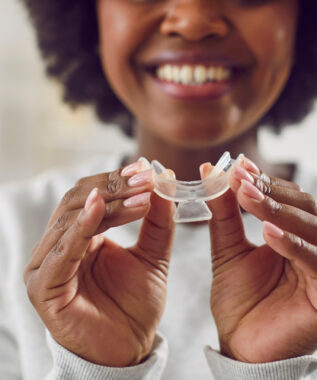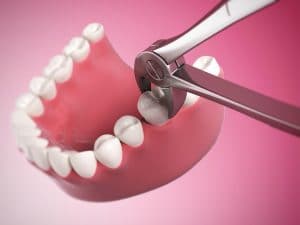 Being one stain or chip away from an otherwise perfect grin can be a nuisance. For a number of blemishes and discrepancies in your smile, however, cosmetic dentistry has a solution. Indeed, advanced practices nowadays makes correcting any visual issues fast and simple, and the same level of innovation and care is utilized to address bigger issues as well. With all of this in mind, however, sometimes a tooth or other concern progresses past a certain point, resulting in more extensive work and even the contemplation of removal. In today’s blog, your Leawood, KS dentist will explain the process involved with saving your smile and preserving your oral health, and when extraction is needed to do so.
Being one stain or chip away from an otherwise perfect grin can be a nuisance. For a number of blemishes and discrepancies in your smile, however, cosmetic dentistry has a solution. Indeed, advanced practices nowadays makes correcting any visual issues fast and simple, and the same level of innovation and care is utilized to address bigger issues as well. With all of this in mind, however, sometimes a tooth or other concern progresses past a certain point, resulting in more extensive work and even the contemplation of removal. In today’s blog, your Leawood, KS dentist will explain the process involved with saving your smile and preserving your oral health, and when extraction is needed to do so.
How In-Office Teeth-Whitening Yields Better Results
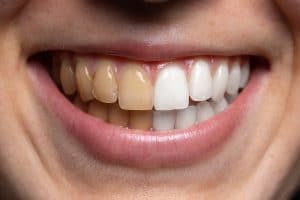 While you may be taking every step to ensure a lifelong smile – including brushing and flossing regularly, visiting our team twice a year for a routine examination and cleaning, and even paying extra mind to the foods and beverages you consume as well as their effects on your teeth – your smile will continue to fade over the years. Age plays a major role that, while it may not warrant restorative measures, may require cosmetic touch-ups to enhance. In today’s blog, your Leawood, KS dentist will look at the way we can brighten your grin multiple shades in a fast and efficient manner.
While you may be taking every step to ensure a lifelong smile – including brushing and flossing regularly, visiting our team twice a year for a routine examination and cleaning, and even paying extra mind to the foods and beverages you consume as well as their effects on your teeth – your smile will continue to fade over the years. Age plays a major role that, while it may not warrant restorative measures, may require cosmetic touch-ups to enhance. In today’s blog, your Leawood, KS dentist will look at the way we can brighten your grin multiple shades in a fast and efficient manner.
Are You A Better Candidate For Partial Or Full Dentures?
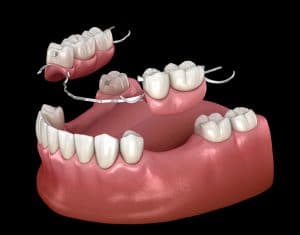 Losing a tooth or multiple teeth as an adult is often not a concern we are actively keeping to the forefront of our minds. In fact, there are often so many things to accomplish in a day that our oral health takes a seat on the back burner, only receiving care in the form of mindless brushing and flossing daily. While this is the first step to a lifelong grin, keep in mind that much more should be done in order to avoid infection, decay, and ultimately loss. In today’s blog, your Leawood, KS dentist will look at some solutions to restore your smile after loss, including with partial or full dentures.
Losing a tooth or multiple teeth as an adult is often not a concern we are actively keeping to the forefront of our minds. In fact, there are often so many things to accomplish in a day that our oral health takes a seat on the back burner, only receiving care in the form of mindless brushing and flossing daily. While this is the first step to a lifelong grin, keep in mind that much more should be done in order to avoid infection, decay, and ultimately loss. In today’s blog, your Leawood, KS dentist will look at some solutions to restore your smile after loss, including with partial or full dentures.
How Your Insomnia is Affecting Your Oral Health
 With hectic schedules and so much to do in a day, sometimes you are not able to get a full night’s rest to properly recharge. Indeed, a restless night and grogginess in the morning tend not to be a significant concern many people pay mind to, let alone believe it has anything to do with your oral health. What you may not know, however, is that it could be indicative of a bigger concern that may require custom treatment to remedy. In today’s blog, your Leawood, KS dentist will look at the potential causes of your nighttime insomnia as well as how it can affect your health if you leave it untreated.
With hectic schedules and so much to do in a day, sometimes you are not able to get a full night’s rest to properly recharge. Indeed, a restless night and grogginess in the morning tend not to be a significant concern many people pay mind to, let alone believe it has anything to do with your oral health. What you may not know, however, is that it could be indicative of a bigger concern that may require custom treatment to remedy. In today’s blog, your Leawood, KS dentist will look at the potential causes of your nighttime insomnia as well as how it can affect your health if you leave it untreated.
Understanding How TMJ Affects You
 Many oral concerns are quite noticeable when you experience them, such as cracking a tooth, enduring sensitivity, and fighting off infection. For other concerns such as an aching jaw or noticeable popping, however, the source of the concern as well as how serious it could be is not as readily or easily known. In today’s blog, your Leawood, KS dentist will look at the potential causes of your jaw pain, including chronic teeth-grinding and the negative effects that can occur if you do not seek proper care.
Many oral concerns are quite noticeable when you experience them, such as cracking a tooth, enduring sensitivity, and fighting off infection. For other concerns such as an aching jaw or noticeable popping, however, the source of the concern as well as how serious it could be is not as readily or easily known. In today’s blog, your Leawood, KS dentist will look at the potential causes of your jaw pain, including chronic teeth-grinding and the negative effects that can occur if you do not seek proper care.
Treating Internal Tooth Decay
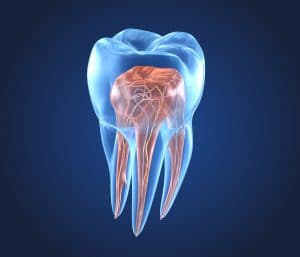 As one of the most common dental concerns that nearly everyone is familiar with, tooth decay can affect your oral health in a number of ways. For instance, it can cause the development of cavities, infect the interior regions of an oral structure, and even cause you to completely lose a tooth. While the latter example typically occurs in extreme circumstances, pay mind to the fact that if you do not have these concerns treated in an efficient manner, this will absolutely be the result. In today’s blog, your Leawood, KS dentist will look at the process of treating decay when it begins to affect the interior of a structure, and what to look out for to avoid it.
As one of the most common dental concerns that nearly everyone is familiar with, tooth decay can affect your oral health in a number of ways. For instance, it can cause the development of cavities, infect the interior regions of an oral structure, and even cause you to completely lose a tooth. While the latter example typically occurs in extreme circumstances, pay mind to the fact that if you do not have these concerns treated in an efficient manner, this will absolutely be the result. In today’s blog, your Leawood, KS dentist will look at the process of treating decay when it begins to affect the interior of a structure, and what to look out for to avoid it.
Conservatively Mending Blemishes with Bonding
 Cracks and chips can occur at any given moment. From biting down a little too hard on a crunchy food item, to tripping and falling face-first onto the sidewalk and everything in-between, our teeth endure a significant amount of wear and tear. While teeth are one of the strongest parts of the human body, they can only retain their strength with routine care. In today’s blog, your Leawood, KS dentist will look at the benefits of restring your gorgeous grin with the help of dental bonding and contouring.
Cracks and chips can occur at any given moment. From biting down a little too hard on a crunchy food item, to tripping and falling face-first onto the sidewalk and everything in-between, our teeth endure a significant amount of wear and tear. While teeth are one of the strongest parts of the human body, they can only retain their strength with routine care. In today’s blog, your Leawood, KS dentist will look at the benefits of restring your gorgeous grin with the help of dental bonding and contouring.
Is It Time For Your Little One’s Checkup?
 It is never too early to begin teaching excellent oral hygiene habits to your little ones, especially proper brushing and flossing. What’s more, the right combination of preventive care at home, maintaining a healthy diet, and attending routinely schedule dental visits can contribute to a lifelong smile and avoid the need for extensive treatment such as extraction or dental implants down the line. Indeed, your dentist recommends a regular checkup at least once every six months, and the same can be said for tiny grins. In today’s blog, your Leawood, KS dentist will explain the importance of attending regular dental visits and the impact it has on your child’s beautiful smile.
It is never too early to begin teaching excellent oral hygiene habits to your little ones, especially proper brushing and flossing. What’s more, the right combination of preventive care at home, maintaining a healthy diet, and attending routinely schedule dental visits can contribute to a lifelong smile and avoid the need for extensive treatment such as extraction or dental implants down the line. Indeed, your dentist recommends a regular checkup at least once every six months, and the same can be said for tiny grins. In today’s blog, your Leawood, KS dentist will explain the importance of attending regular dental visits and the impact it has on your child’s beautiful smile.
Why Your Jaw Needs a Dental Implant
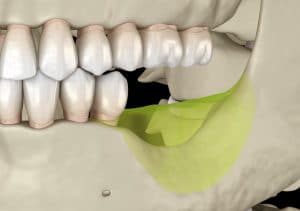 When it comes to dental care, maintaining a healthy smile is a priority for a number of individuals. What’s more, the notion of having a tooth extracted due to infection or other cause is nobody’s first choice, and a number of alternatives may be sought to prevent that from occurring. In some circumstances, however, removal may be the only step left in order to preserve your oral health. When you do have a structure removed, however, keep in mind that it is not the end of the journey. In today’s blog, your Leawood, KS dentist will explain why it is important to have a missing tooth replaced and what happens to your function when you do not.
When it comes to dental care, maintaining a healthy smile is a priority for a number of individuals. What’s more, the notion of having a tooth extracted due to infection or other cause is nobody’s first choice, and a number of alternatives may be sought to prevent that from occurring. In some circumstances, however, removal may be the only step left in order to preserve your oral health. When you do have a structure removed, however, keep in mind that it is not the end of the journey. In today’s blog, your Leawood, KS dentist will explain why it is important to have a missing tooth replaced and what happens to your function when you do not.
What Periodontal Care Really Means
 Attending routine preventive dental visits for some is not as simple as it is for others. In fact, fear or anxiety can often set in, causing patients to skip their regular visits. When this occurs, your risk for disease, infection, and more increase drastically, as you do not have a trained professional consistently monitoring the health of your smile. In today’s blog, your Leawood, KS dentist will look at the dangers of skipping your dental visit and why it may warrant extra periodontal care.
Attending routine preventive dental visits for some is not as simple as it is for others. In fact, fear or anxiety can often set in, causing patients to skip their regular visits. When this occurs, your risk for disease, infection, and more increase drastically, as you do not have a trained professional consistently monitoring the health of your smile. In today’s blog, your Leawood, KS dentist will look at the dangers of skipping your dental visit and why it may warrant extra periodontal care.





